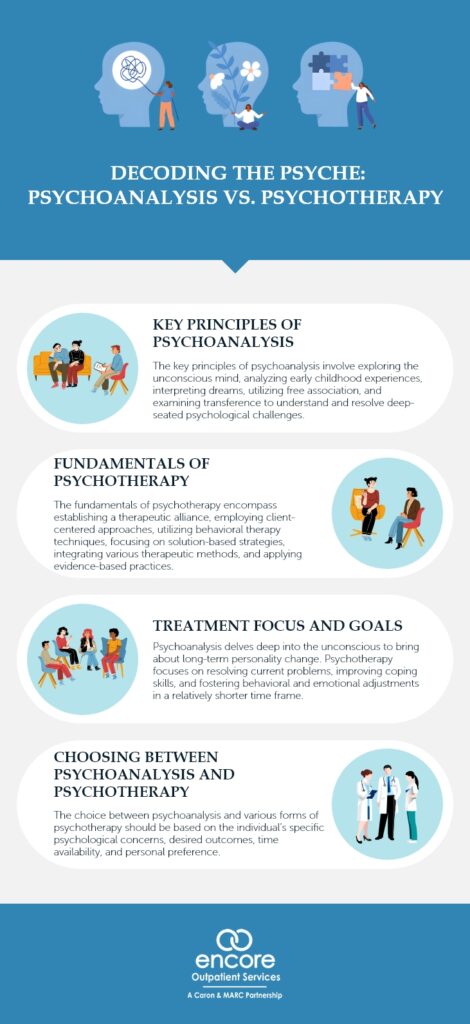Our dedication lies not just in treating symptoms but in addressing the root causes, offering a holistic approach that integrates the best of therapeutic practices with the warmth of community support.
Decoding the Psyche: Psychoanalysis vs. Psychotherapy

Psychoanalysis and psychotherapy are two distinct approaches to treating mental health concerns. Psychoanalysis, a method primarily associated with Sigmund Freud, delves deep into the unconscious mind, seeking to uncover and understand the roots of human behavior. In contrast, psychotherapy encompasses a broader range of therapeutic techniques aimed at addressing and resolving current psychological disorders. This post aims to provide a clear and detailed comparison of both approaches, focusing on their principles, methodologies, and applications. By delving into the contrasting theories and practices that define psychoanalysis and psychotherapy, we seek to empower individuals with the knowledge needed to navigate the array of mental health interventions that are available.
Historical Background
The historical roots of psychoanalysis and psychotherapy are both rich and distinct, shaping much of modern psychological thought and practice.
The inception of psychoanalysis dates back to the late 19th century, with Sigmund Freud, an Austrian neurologist, pioneering this approach. Freud’s work, particularly his development of the theory of the unconscious mind and the Oedipus complex, laid the foundation for psychoanalysis. His methods, such as dream analysis and free association, were revolutionary in exploring mental processes previously considered inaccessible.
While psychoanalysis focused on the unconscious, psychotherapy evolved as a broader field, encompassing various approaches aimed at treating mental health conditions. The early 20th century saw the emergence of different schools of psychotherapy, influenced by figures like Carl Rogers and his client-centered therapy and Aaron Beck’s cognitive-behavioral therapy. These approaches emphasized the conscious mind and the individual’s current experiences rather than the unconscious and past experiences.
Initially, psychoanalysis dominated the field of mental health treatment. However, throughout the 20th century, psychotherapy diversified significantly, incorporating elements from different disciplines, including psychology, philosophy, and even the arts. This period also witnessed an increasing emphasis on empirical research and evidence-based practice in psychotherapy, contrasting with the more interpretative nature of psychoanalysis.
Today, both psychoanalysis and psychotherapy continue to evolve, informed by ongoing research and developments in psychology, neuroscience, and therapeutic techniques. The integration of new theories and methodologies has expanded the scope and effectiveness of treatments in addressing various mental health concerns.

Types of Psychoanalysis
There are different types of psychoanalysis. Some of the major variations include:
- Classical (Freudian) Analysis – Developed by Sigmund Freud, this is the original form of psychoanalysis. It emphasizes the exploration of the unconscious human mind, dream interpretation, and childhood experiences. The aim is to uncover and understand unconscious motivations and conflicts, leading to insight and psychological relief.
- Jungian Analysis – Developed by Carl Jung, a former colleague of Freud, Jungian analysis diverges from Freudian theory, introducing concepts like the collective unconscious and archetypes. This approach aims to achieve individuation, a process of integrating various parts of the psyche for psychological wholeness and self-realization.
- Interpersonal Psychoanalysis – Stemming from the theories of American psychiatrist Harry Stack Sullivan, this approach emphasizes social and interpersonal relationships. It focuses on the patient’s current relationships and social interactions as vital in understanding and treating mental illness. The goal is to improve interpersonal functioning and understand the social context of psychological problems.
- Modern Psychoanalysis – This type of psychoanalysis is adaptable, often integrating techniques from other therapeutic models. Modern psychoanalysis is an evolution of classical analysis, incorporating contemporary psychological theories and research. The focus is on making psychoanalysis accessible and relevant to modern mental health needs, emphasizing both the exploration of unconscious processes and practical psychological improvements.
Each psychoanalytic approach offers a unique lens through which to view and treat mental health symptoms, reflecting the evolving landscape of psychoanalytic theory and practice. The choice of approach depends on the individual’s specific needs, preferences, and the nature of their psychological concerns.
Types of Psychotherapy
There are many forms of psychotherapy, each tailored to meet different psychological needs and objectives.
- Cognitive Behavioral Therapy (CBT) – CBT is a short-term, goal-oriented therapy that is highly structured. It concentrates on changing negative thought patterns and behaviors, addressing the way individuals perceive and react to various situations. CBT is widely used for treating anxiety, depression, phobias, and other mental health conditions.
- Dialectical Behavior Therapy (DBT) – DBT emphasizes mindfulness, emotional regulation, distress tolerance, and interpersonal effectiveness. DBT is particularly effective for individuals with borderline personality disorder, chronic suicidal ideation, and self-harm tendencies.
- Psychodynamic Therapy – This therapy evolved from psychoanalytic theory. It’s based on the theory that emotional problems are caused by unconscious conflicts, often stemming from childhood trauma. Psychodynamic therapy seeks to increase self-awareness and understanding of how the past influences current behavior.
- Interpersonal Psychotherapy (IPT) – IPT focuses on improving interpersonal relationships and developing social skills as a way to treat symptoms of depression, anxiety, and other mood disorders.
- Exposure Therapy – This psychotherapy helps individuals confront their fears and anxieties by gradually and systematically exposing them to the situations or objects they fear. Exposure therapy is commonly used in treating phobias, panic disorder, and post-traumatic stress disorder (PTSD).
- Psychodrama Therapy – Psychodrama is often performed in a group setting, where participants can act out their experiences and emotions in front of others. This therapy has been used to treat various mental health conditions, such as depression, anxiety, and trauma, as well as to improve social skills and self-esteem.
- Nature-Based Therapy – This holistic approach to mental and physical health uses the natural environment as an important tool for healing. Nature-based therapy can be performed individually or in group settings and can include activities such as walking or running in natural environments, gardening, or even kayaking or rock climbing.
- Yoga and Movement Therapy – This holistic approach utilizes yoga postures, conscious movement exercises, mindfulness, and breathing techniques to promote physical, emotional, and mental well-being. This psychotherapy can be used to relieve chronic pain, improve mobility, and address a wide range of health conditions.
Each psychotherapeutic approach offers distinct methodologies and insights, catering to a wide range of mental health needs. The choice of psychotherapy depends on the individual’s specific concerns, treatment goals, and personal preferences.
Key Principles of Psychoanalysis
Psychoanalysis is founded on several key principles that guide its theory and practice:
- The Unconscious Mind – Central to psychoanalysis is the concept of the unconscious mind. This principle posits that much of our mental operations, including desires, feelings, and memories, occur outside of conscious awareness, profoundly influencing behavior and thoughts.
- Childhood Experiences – This type of therapy emphasizes the significance of early childhood experiences in shaping personality and behavior. It’s believed that unresolved conflicts during these formative years could manifest as psychological challenges in adulthood.
- Dream Analysis – Dreams are a pathway to understanding the unconscious mind. Dreams are symbolic representations of unconscious desires and conflicts, necessitating analysis for deeper insight.
- Free Association – This form of therapy involves patients speaking freely about whatever thoughts or memories come to mind. It’s used to uncover hidden thoughts and feelings that are linked to unconscious processes.
- Defense Mechanisms – Psychoanalysis identifies various defense mechanisms, like repression, denial, and projection, as strategies employed by the psyche to manage anxiety and protect the individual from uncomfortable thoughts and feelings.
- Transference Analysis – This occurs when patients project feelings and attitudes from significant relationships onto the therapist. Analyzing this transference can provide insights into a patient’s relational patterns and unresolved issues.
- Psychosexual Development – Each stage of psychosexual development is characterized by the focus of libido (sexual drive) on different areas of the body. Difficulties in these stages could lead to specific personality traits and behaviors.
- Interpretation – In psychoanalysis, the therapist interprets the patient’s words, actions, and dreams to uncover the underlying unconscious meaning. This interpretation is crucial for gaining insight and facilitating change.
By exploring these principles, psychoanalysis aims to bring unconscious conflicts to conscious awareness, allowing for a deeper understanding of one’s self and the resolution of psychological distress.
Fundamentals of Psychotherapy
Psychotherapy encompasses a range of therapeutic approaches, each grounded in distinct principles and techniques aimed at improving mental health and well-being.
- Therapeutic Alliance – A fundamental aspect of psychotherapy is the establishment of a strong, trusting relationship between the therapist and the patient. This alliance is considered crucial for effective therapy and provides a safe space for individuals to explore their thoughts and feelings.
- Client-Centered Approach – Originating from the work of Carl Rogers, this approach emphasizes the therapist’s empathy, unconditional positive regard, and genuineness. It focuses on the patient’s perspective and their ability to progress on their own.
- Behavioral Therapy Techniques – Behavioral therapy techniques such as CBT operate on the premise that changing negative thought patterns can lead to changes in behavior and emotions.
- Solution-Focused Therapy – This approach concentrates on finding solutions in the present time and exploring one’s hope for the future to find quicker resolutions to problems. It’s goal-directed and focuses on client strengths and resources.
- Eclectic and Integrative Approaches – Many psychotherapists use an eclectic or integrative approach, drawing from various techniques and theories to tailor therapy to each client’s unique needs.
- Evidence-Based Practice – Psychotherapy increasingly emphasizes the use of treatments that are supported by research and clinical evidence. This approach ensures the application of the most effective and appropriate therapeutic techniques.
- Focus on Current Problems – Unlike psychoanalysis, which delves into past experiences, psychotherapy often concentrates on current challenges and practical solutions. It works to develop coping mechanisms and strategies to address immediate concerns.
- Diverse Modalities – Psychotherapy can be conducted in various formats, including individual, group, couples, or in a family therapy setting.
Psychotherapy aims to empower individuals by employing these fundamentals, helping them understand and manage their emotions, develop healthier coping mechanisms, and improve their overall mental health and life satisfaction.
Treatment Focus and Goals
Psychoanalysis and psychotherapy adopt fundamentally different approaches to mental health, with each focusing on various aspects of psychological well-being.
The focus and goal of psychoanalysis :
- Uncovering the Unconscious Mind – The primary focus of psychoanalysis is to reveal and understand the unconscious drivers of behavior, thoughts, and emotions, often rooted in early childhood experiences.
- Resolving Internal Conflicts – Psychoanalysis aims to bring unresolved conflicts, especially from childhood, into conscious awareness, facilitating deeper self-understanding and resolution.
- Long-Term Personality Change – The goal is not just physical symptom relief but profound and lasting changes in personality and emotional development.
- Insight and Self-Exploration – Psychoanalysis encourages deep introspection, leading to greater insight into one’s behavior and thought patterns.
The focus and goal of psychotherapy:
- Addressing Current Problems – Psychotherapy typically concentrates on current life challenges, distress, and mental health symptoms, seeking to provide immediate relief and practical solutions.
- Behavioral and Cognitive Changes – The goal is often to modify problematic behaviors, negative thought patterns, and emotions to improve overall functioning and well-being.
- Skill Development – Psychotherapy aims to equip individuals with coping mechanisms, communication skills, and strategies to handle life’s challenges effectively.
- Short-Term Relief – Unlike psychoanalysis, psychotherapy often has a more immediate focus, with goals set around specific challenges or symptoms and aiming for quicker resolution.
While psychoanalysis delves deep into the unconscious to bring about long-term personality change, psychotherapy focuses on resolving current problems, improving coping skills, and fostering behavioral and emotional adjustments in a relatively shorter time frame.
Duration and Intensity of Sessions
The duration and intensity of sessions in psychoanalysis and psychotherapy vary significantly, reflecting their differing approaches and therapeutic goals.
Characteristics of psychoanalysis therapy sessions:
- Longer Duration – Psychoanalytic sessions are typically long-term treatments, often extending over several years. This duration allows for an in-depth exploration of the unconscious mind and complex emotional issues.
- High Frequency – Therapy sessions usually occur multiple times per week, often ranging from three to five times. This high frequency facilitates a continuous and intensive therapeutic process.
- Standard Session Length – In psychoanalysis, therapy sessions typically last for 50 minutes. However, the duration can vary depending on the individual circumstances and the specific approach used.
- Depth of Exploration – The nature of psychoanalysis requires a deeper and more prolonged exploration of thoughts and feelings, with a focus on uncovering deeply rooted unconscious processes.
Characteristics of psychotherapy sessions:
- Varied Duration – While some forms of psychotherapy can be short-term, others can be long-term, spanning months to years.
- Varied Frequency – Individual sessions vary in frequency based on needs, ranging from every day to once a week; however, the initial phase of psychotherapy includes more intensive and frequent individual sessions in order to establish an individualized treatment strategy.
- Standard Session Length – The typical length of a psychotherapy session is around 45 to 50 minutes, although some therapists may schedule sessions for up to 60 minutes. The length of a session can vary depending on the therapist’s approach, the patient’s needs, and the type of psychotherapy being used.
- Focused Exploration – Psychotherapy is often more focused on current challenges and practical solutions, with a goal-oriented approach to treatment.
These differences in duration and intensity reflect each therapeutic practice’s distinct objectives and methods.
Choosing Between Psychoanalysis and Psychotherapy
Deciding whether to pursue psychoanalysis or psychotherapy depends on various factors, including individual needs, psychological concerns, and treatment goals.
- Nature of Your Psychological Issues – Psychoanalysis may be more suitable for individuals dealing with deep-rooted psychological problems, often originating in early childhood. It benefits those seeking to understand the unconscious influences on their behavior. Psychotherapy, on the other hand, is generally chosen for addressing more immediate, conscious challenges, such as coping with stress, anxiety, depression, or relationship problems.
- Time Commitment – Psychoanalysis requires a significant time commitment, often involving multiple sessions per week over several years. If you’re seeking a long-term, in-depth exploration of your psyche, psychoanalysis could be the appropriate choice. Psychotherapy, on the other hand, typically requires a shorter time commitment, with weekly sessions spread out across a few months to a year, making it a more feasible alternative for people looking for short-term, focused interventions.
- Treatment Goals – If the goal is to achieve deep personality changes and profound insights into one’s own mind, psychoanalysis might be the right path. For those aiming to develop specific coping strategies, improve mental health symptoms, or address current life challenges, psychotherapy is often the preferred approach.
- Personal Preferences – Individual comfort with the therapeutic process also plays a crucial role. Some may prefer the more intensive and introspective nature of psychoanalysis, while others may find the goal-oriented, problem-solving approach of psychotherapy more appealing.
- Therapist’s Recommendation – Consulting with a mental health professional can provide guidance on the most suitable approach based on one’s unique circumstances and psychological needs.
The choice between psychoanalysis and various forms of psychotherapy should be based on the individual’s specific psychological concerns, desired outcomes, time availability, and personal preference. Both forms of therapy offer valuable pathways to improved mental health and emotional wellness.
If you’re looking at psychotherapy as a path to recovery and wellness, Encore Outpatient Services is ready to provide you with the individualized care you need. Our dedicated team of medical providers specializes in addressing a spectrum of challenges, including substance use disorders, trauma, and various mental health challenges. At Encore, we blend traditional therapeutic methods with innovative practices to deliver a holistic and personalized treatment experience. Our supportive, interdisciplinary environment is designed to cater to your unique journey. Contact Encore Outpatient Services today and embark on your recovery journey with a team that values and respects your unique story. Join us as we guide you toward a healthier you.
Let Us Support You On Your Recovery Journey!
Copyright 2026 Encore Outpatient Services | All Rights Reserved



